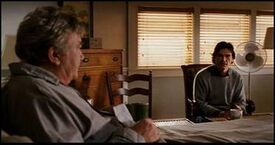Big Phish
Big Phish is a 2003 American blockbuster fantasy film with visual effects, acting, direction, and production by Tim Burton, mastermind of such children-scaring fantasy-horror pictures as The Nightmare Before Christmas and Bill and the Giant Belch. It is about a rustic-accented, endearing man in his twenties who sets about scamming people for miles around out of thousands of dollars. He accomplishes this by hypnotizing them all into believing the world is full of storybook characters, then robbing them all in ways that would feel proper in the fantasy he creates.
The film's shtick during its run in theaters was that after each showing, every single solitary member of the audience found their wallets missing. Critics ostracized Big Phish for being nonsensical and riddled with unforgivable plot holes, as well as its depressing soul-crushing nature that seemed to pervade every Tim Burton production. The movie also received mixed reception in the general moviegoing public, as it robbed many of them blind, and a class action lawsuit was later filed.
Plot[edit]
The movie is a series of epistles, each more urgent in tone than the last. Reviewers recommend wearing spiraled sunglasses whilst reading, as a precaution against Chapter 11 bankruptcy and death:
| Feb. 8, 2001
To whom it may concern, I am Edward Bloom, a Nigerian with big ambitions. I plan to make my own way in the world, but to be very frank I can't do it in this condition. I'm not used to the cuisine here, and honestly, the dinosaurs in Nigeria aren't very friendly to those who stray out of the safe villages. It is very dangerous here and all I ever wished from life is to leave. The thing is, this particular ward of Nigeria has been surrounded by a tall, barbed-wire fence, to keep the darkness that lies within trapped. I am a big man in a small pond, and I am also trapped here. Fortunately, a rich poet in New York, whom I helped escape a dangerous province of my homeland, has extended me a venture grant in the sum of 3.5 million US dollars. Regrettably, I have no way of transferring these funds out of Nigeria. I need a hook to bite, to be lifted out of the backwaters of mediocrity. To fulfill my destiny, please contact me to make arrangements to transfer these funds to a safe account in the United States. Hopefully yours,
ebloom@aol.com |
After Bloom (played by Albert Finney as an old man, Ewan McGregor as a young man, and Perry Walston as a younger not-man) flees Africa (on a fishing trawler owned by Neptune, according to him) his bulk mailings grow more touching and romantic:
| Nov. 14, 2001
To whom it may concern, I have seen the woman I am going to marry. Though I've nothing to give her, I am certain that it is our destiny to be together. I've never been much of a speaker, and in fact I go hoarse whenever I see her. I just know I can't speak to her without the world's largest repertoire of different dazzling pickup lines for every situation, place, and sunset. That's why I created pickuplines.web. All I beg of you are some sweet words and $40, as my boss will only pay me in hints about where my future wife lives. For every twenty pickup lines I use, I will send one contributor a free iPod gizmo as his reward. I refuse to stop sacrificing my hard-earned money until my wife comes to realize that she loves me. I don't want to die alone. Please pity this lonely man and send a small contribution. Desolately yours,
http://www.pickuplines.web |
From small hamlets to burgeoning cities, he has never lived in a place unmolested by creatures from story books:
| Mar. 25, 2002
To the citizens of Tombstone, Arizona, It may surprise you to know this, but 17 years ago when I came to your town, there were evil spirits, killer trees, killer bees, and fearsome giants in the surrounding woods, and the mayor continually alluded to Tombstone being a Hades on Earth. Folks were prevented from leaving the town's borders or wearing the color white, for fear that the poltergeists might strike again. Almost two short decades have passed, but there is a distinct possibility that the spirits will bear some sort of grudge against descendants of the original inhabitants of your sleepy hollow. That's why I'm doing this public service in raising awareness about ghostly grudges. I strongly urge you to use this independent site to get yourself checked for spiritual anomalies or other EKG readings:
All the site needs is your name, e-mail address, credit card number, and expiration date. Remember, you could be next. Dangerously yours,
ebloom@hotmail.com |
Before long, Bloom learns that he has left a son behind during his travels through eastern Europe. They correspond by e-mail, but young Will Bloom (played by Grayson Stone as a little kid and Billy Crudup as an adult) is beset with the task of sorting out his father's sincere e-mails from the relay-spam junk sent by the same address. This clouds the waters of their relationship, and for ten years they do not correspond again.
His spam days long finished, Edward e-mails his son to tell him daddy is dying. Pushing aside his memories of the chain letters, fake casinos, and phishing schemes, Will flies to Yukon territory, where his father lives in refuge from the authorities. His son questions him in confusion on why he is hiding out in such a place. A habitual liar, Bloom responds with a tall tale in which he leads a tribe from the USSR over a temporarily risen land bridge and through Alaska. Upon hearing this, his son once again becomes enraged.
However, seeing his father in the hospital, Will comes to identify with the scam artist's ways, and agrees to try it himself. What follows is an on-screen epidemic of sleaze, in which Bloom's son spins the greatest confidence trick of all time, sending wave after wave of nauseating lies at the audience. The movie ends with a muted trumpet and the words, "Check your purse."
Reception[edit]
Critical reception[edit]
The film received mixed reviews from critics. Roger Ebert gave it "One thumb up and one thumb down," while The Anarchist Star sneered "Yes, we get it. What we thought was fantasy turned out to be real. Seen it all before." Michael Medved felt that "Burton's action-empty offering butchers the winter blockbuster form. Would have been better released over Easter." On the slightly more positive side, The Weekly Times believed "Big Phish was boring, depressing, and it cheated me out of my life savings. Three stars," while Extortion Revenue Streams Ltd. opined that the movie was "Performance art at its finest. Would buy again."
Lawsuit[edit]
The reaction to the film grew to unprecedented levels in the winter of 2003–04. Doctors confirmed the film caused irreparable brain damage. With the winter months came cold, aggravating the state of the newly mentally ill and busted movie-going public. No fewer than two slasher crossover films during that season made the situation still worse, until riot control was necessary.
During the ensuing lawsuit and its fifteen joiners, two distinct groups entered the open:
- The art liberals – A group composed largely of left-wing cat-lovers. They hailed the film as dramatic, free-form, real-world art. According to them, the mind-bending subliminal messages embedded in the vignettes of cute bunny rabbits, fast-growing grass, and broken fortunes simply involved the audience further in the film. Tim Burton championed this view himself, as of course his production company, Moaning Tricycle, was having its pants sued off.
- The lynch mob – Dulled by the bustle of everyday life, the lynch mob had no patience with revolutionary new forms of convulsant cinema. They simply wanted their money back, and to see Tim Burton and his associates hanged.
The case heard no fewer than fifty impassioned speeches by deranged lunatics, including an appearance by Danny DeVito, who had been tricked into acting like a rabid dog both on and off-screen. The suit was also decisive of recent politics, as three Supreme Court judges were felled during it.
Aftermath[edit]
In the end, the UK courts found in favor of the class in the sum of ₤1.8 million. The debt was so crushingly heavy that not even the strongest bankruptcy could support it. So Atlas the Giant shouldered the weight of the great debt. Edward Bloom could be seen by his left foot, looking up and winking. They both strode off into the sunset, enormous bags of cash under Bloom's right arm.
See also[edit]
- James and the Giant Peach
- A Series of Unfortunate Events
- Charlie and the Chocolate Factory
- Reel Big Fish
- Big Fish Theory
- Miley Cyrus
- Pearl Jam
- I've Seen All Good People
| Big Phish (2003) ♦ Edward 40-Hands (1990) ♦ Goldilocks and the Triumvirate of Bears (2013) ♦ Harry Potter & the Chamber of Semen (2002) ♦ Harry Potter & the Gobble Gobble Yikes (2005) ♦ Harry Potter & the Half Inch Prick (2009) ♦ Harry Potter & the Head Job Swallow (2010) ♦ Harry Potter & the Order of the Fuckhead (2007) ♦ Harry Potter & the Philosophers Stoned (1998) ♦ Harry Potter & the Prisoner of David Yikes (2004) ♦ Hawk the Slayer (1980) ♦ James and the Giant Peach (1996) ♦ Labyrinth (1986) ♦ The Lord of the Rings (trilogy 2001-2003) ♦ Mary Poppins (1964) ♦ Nazareth Park (2006) ♦ The NeverEnding Story (1984) ♦ Pan's Labyrinth (2006) ♦ Pirates of the Caribbean: At World's End (2007) ♦ Pirates of the Caribbean: The Curse of the Black Pearl (2003) ♦ Pirates of the Caribbean: Dead Man's Chest (2006) ♦ Snakes on a Plane (2006) ♦ The Wizard of Aus (1989) |


